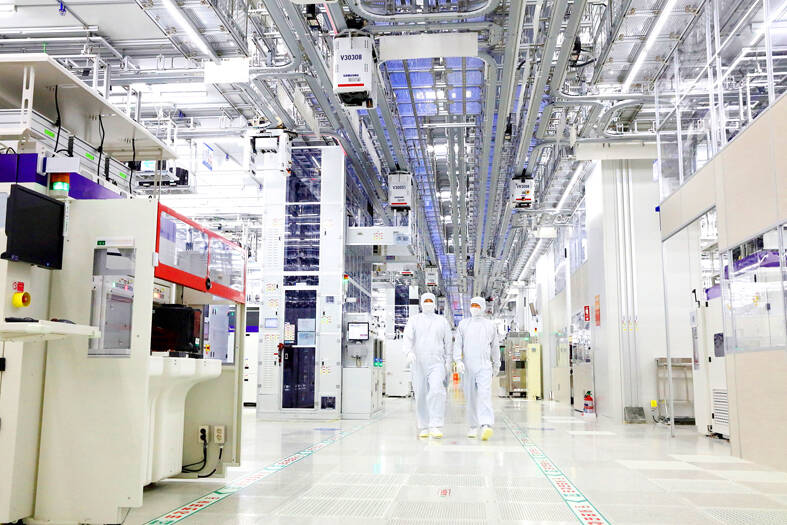Samsung Electronics Co has delayed mass production plans at its new chip plant in Taylor, Texas, the Korea Economic Daily reported, potentially dealing another blow to the administration of US President Joe Biden’s ambition to increase domestic semiconductor supplies.
Mass production at the upcoming US$17 billion fab would begin in 2025, the newspaper reported, citing a speech by Samsung foundry business president Choi Si-young at an industry event in San Francisco.
Samsung previously said the factory would start production in the second half of next year when it announced the investment in 2021. A spokesperson said the company cannot confirm the mass production schedule.

Photo: Samsung Electronics / Handout via Reuters
The report followed an earlier decision by Samsung’s bigger rival, Taiwan Semiconductor Manufacturing Co (TSMC, 台積電), to postpone production at its new Arizona fab to 2025 from next year due to a shortage of experienced construction workers and machine installation technicians.
Any delay at the US sites operated by the world’s two leading contract chipmakers would be a setback to Biden’s grand plan to boost chip production on US soil to avoid future supply disruptions like the 2021 shortage that cost companies hundreds of billions in revenue.
Revisions to TSMC’s and Samsung’s plans would mean their new plants, worth tens of billions of US dollars, might only come online after the US presidential election next year.
US environmental permit issues and the Biden administration’s slowness in delivering financial support have been plaguing domestic chip projects.
More than a year after Biden signed the CHIPS and Science Act into law, promising US$100 billion in support to new semiconductor plants in the US, his government has made one grant of only US$35 million to the US subsidiary of British aerospace firm BAE Systems PLC.

Semiconductor shares in China surged yesterday after Reuters reported the US had ordered chipmaking giant Taiwan Semiconductor Manufacturing Co (TSMC, 台積電) to halt shipments of advanced chips to Chinese customers, which investors believe could accelerate Beijing’s self-reliance efforts. TSMC yesterday started to suspend shipments of certain sophisticated chips to some Chinese clients after receiving a letter from the US Department of Commerce imposing export restrictions on those products, Reuters reported on Sunday, citing an unnamed source. The US imposed export restrictions on TSMC’s 7-nanometer or more advanced designs, Reuters reported. Investors figured that would encourage authorities to support China’s industry and bought shares

TECH WAR CONTINUES: The suspension of TSMC AI chips and GPUs would be a heavy blow to China’s chip designers and would affect its competitive edge Taiwan Semiconductor Manufacturing Co (TSMC, 台積電), the world’s biggest contract chipmaker, is reportedly to halt supply of artificial intelligence (AI) chips and graphics processing units (GPUs) made on 7-nanometer or more advanced process technologies from next week in order to comply with US Department of Commerce rules. TSMC has sent e-mails to its Chinese AI customers, informing them about the suspension starting on Monday, Chinese online news outlet Ijiwei.com (愛集微) reported yesterday. The US Department of Commerce has not formally unveiled further semiconductor measures against China yet. “TSMC does not comment on market rumors. TSMC is a law-abiding company and we are

FLEXIBLE: Taiwan can develop its own ground station equipment, and has highly competitive manufacturers and suppliers with diversified production, the MOEA said The Ministry of Economic Affairs (MOEA) yesterday disputed reports that suppliers to US-based Space Exploration Technologies Corp (SpaceX) had been asked to move production out of Taiwan. Reuters had reported on Tuesday last week that Elon Musk-owned SpaceX had asked their manufacturers to produce outside of Taiwan given geopolitical risks and that at least one Taiwanese supplier had been pushed to relocate production to Vietnam. SpaceX’s requests place a renewed focus on the contentious relationship Musk has had with Taiwan, especially after he said last year that Taiwan is an “integral part” of China, sparking sharp criticism from Taiwanese authorities. The ministry said

US President Joe Biden’s administration is racing to complete CHIPS and Science Act agreements with companies such as Intel Corp and Samsung Electronics Co, aiming to shore up one of its signature initiatives before US president-elect Donald Trump enters the White House. The US Department of Commerce has allocated more than 90 percent of the US$39 billion in grants under the act, a landmark law enacted in 2022 designed to rebuild the domestic chip industry. However, the agency has only announced one binding agreement so far. The next two months would prove critical for more than 20 companies still in the process